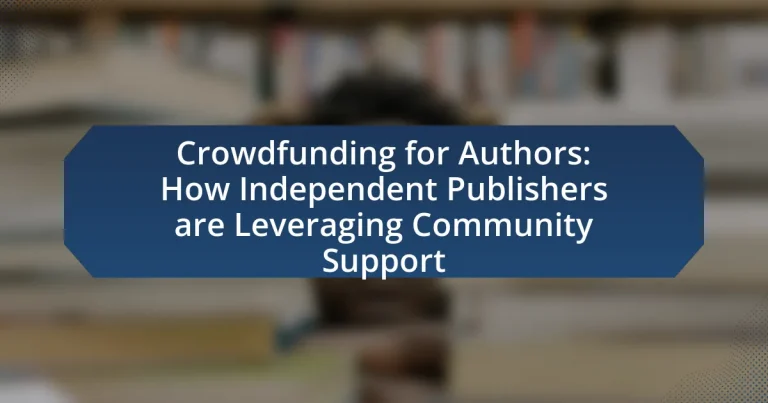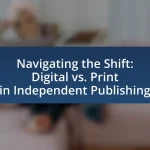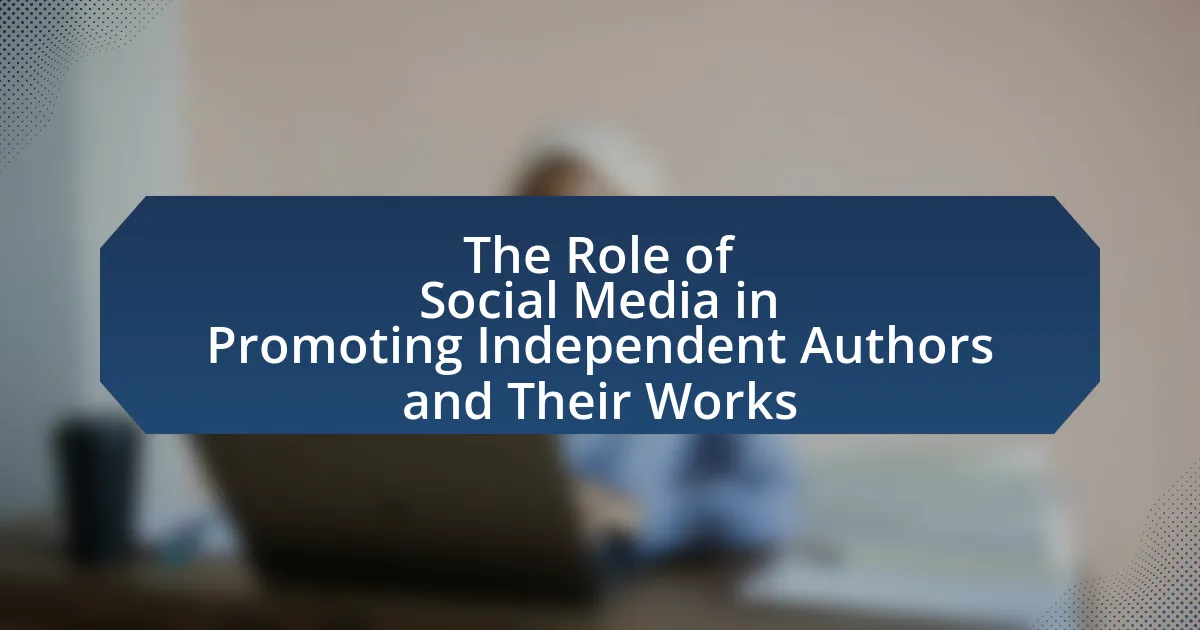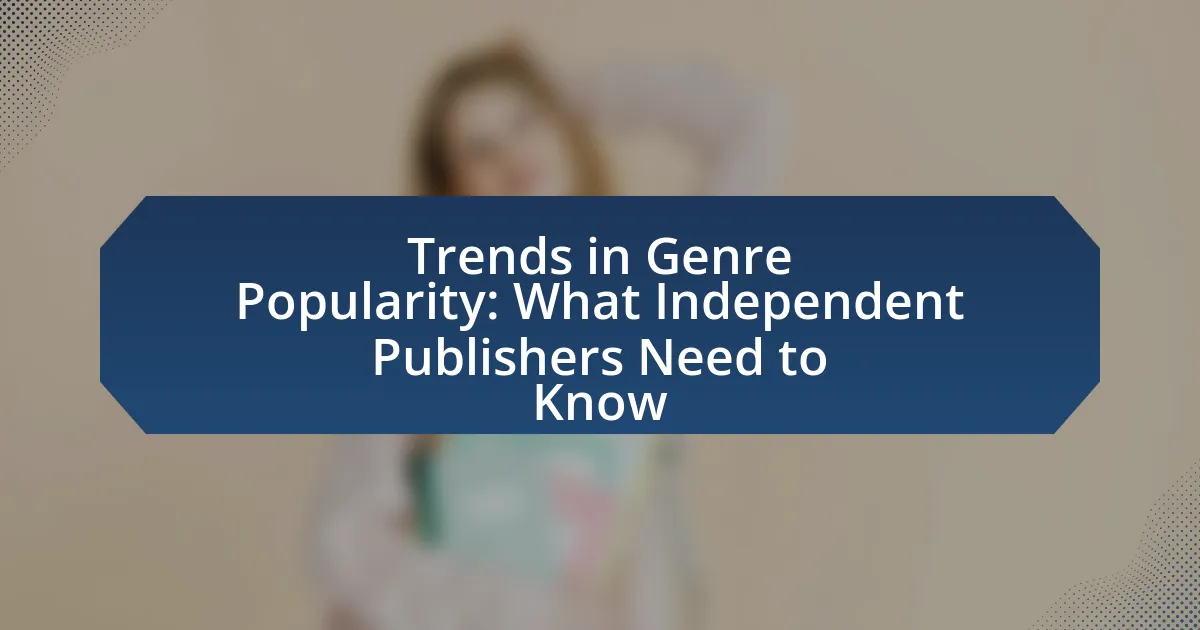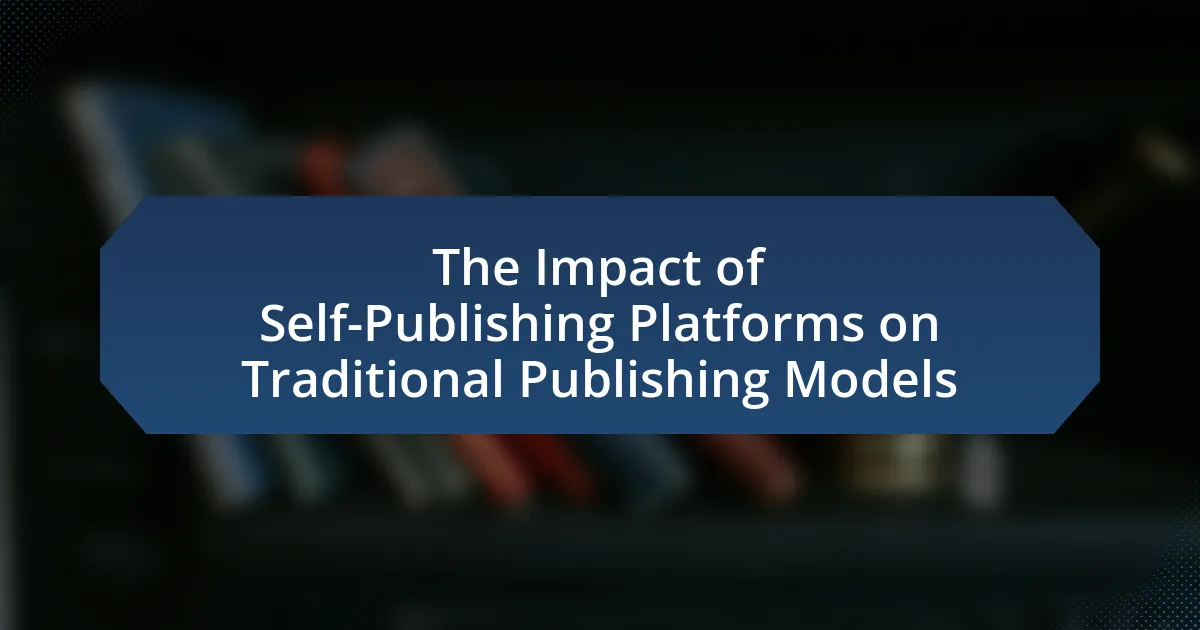Crowdfunding for authors is a financial strategy that enables writers to raise funds from a large audience through online platforms, facilitating the creation and publication of their works. This article explores how independent publishers utilize crowdfunding to finance book production and distribution, highlighting popular platforms like Kickstarter and Indiegogo, and outlining key steps for launching successful campaigns. It also addresses the challenges independent authors face, the benefits of community engagement, and various crowdfunding models, including reward-based and equity crowdfunding. Additionally, the article provides best practices for marketing campaigns and managing expectations, emphasizing the importance of building a supportive community for future projects.
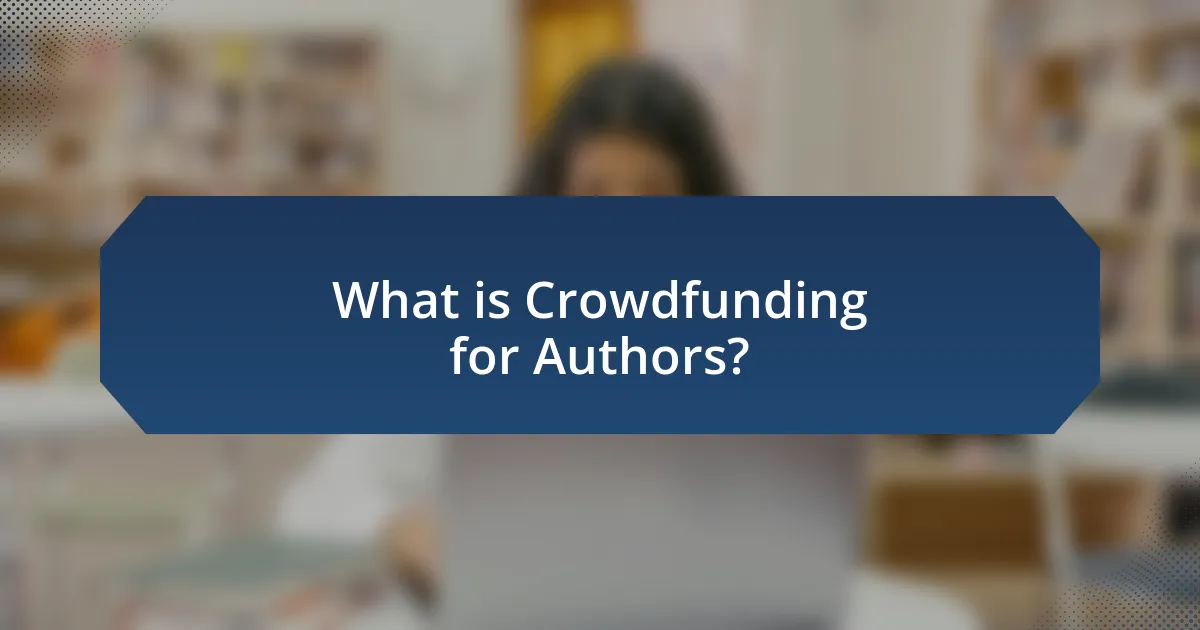
What is Crowdfunding for Authors?
Crowdfunding for authors is a method where writers raise funds from a large number of people, typically through online platforms, to support the creation and publication of their works. This approach allows authors to gather financial backing directly from their audience, enabling them to cover costs such as editing, design, and marketing. According to a 2021 report by Kickstarter, over 1.5 million projects have been funded, with a significant portion dedicated to publishing, demonstrating the effectiveness of crowdfunding in the literary field.
How does crowdfunding work for independent publishers?
Crowdfunding for independent publishers involves raising funds from a large number of people, typically via online platforms, to finance the production and distribution of books. Independent publishers create campaigns on crowdfunding websites, such as Kickstarter or Indiegogo, where they present their projects, set funding goals, and offer rewards to backers, such as early access to books or exclusive content. This method allows publishers to gauge interest in their projects before committing resources, as successful campaigns can validate market demand. According to a 2021 study by the University of Pennsylvania, over 50% of crowdfunding projects in the publishing sector reached their funding goals, demonstrating the effectiveness of this approach in securing financial support from the community.
What platforms are commonly used for crowdfunding in publishing?
Commonly used platforms for crowdfunding in publishing include Kickstarter, Indiegogo, and Patreon. Kickstarter is known for its all-or-nothing funding model, which encourages authors to set clear funding goals and timelines. Indiegogo offers flexible funding options, allowing creators to keep funds raised even if they do not meet their goal. Patreon operates on a subscription model, enabling authors to receive ongoing support from their community in exchange for exclusive content. These platforms have successfully facilitated numerous publishing projects, demonstrating their effectiveness in connecting authors with potential backers.
What are the key steps in launching a crowdfunding campaign?
The key steps in launching a crowdfunding campaign include defining the project, setting a funding goal, choosing a crowdfunding platform, creating a compelling campaign page, developing a marketing strategy, and engaging with backers throughout the campaign. Defining the project involves clearly articulating the purpose and vision, which is crucial for attracting potential supporters. Setting a funding goal requires careful consideration of the budget and expenses associated with the project, ensuring it is realistic and achievable. Choosing a crowdfunding platform, such as Kickstarter or Indiegogo, is essential as each platform has different features and audience demographics. Creating a compelling campaign page includes writing a persuasive description, adding visuals, and outlining rewards for backers, which can significantly impact funding success. Developing a marketing strategy involves promoting the campaign through social media, email newsletters, and other channels to reach a wider audience. Finally, engaging with backers during the campaign fosters community support and can lead to increased funding, as backers appreciate updates and interaction.
Why is crowdfunding becoming popular among authors?
Crowdfunding is becoming popular among authors because it provides a direct way to finance their projects while engaging their audience. This method allows authors to raise funds before publication, reducing financial risk and enabling them to gauge interest in their work. According to a 2021 study by the University of California, 38% of authors reported using crowdfunding to support their writing projects, highlighting its growing acceptance in the literary community. Additionally, platforms like Kickstarter and Indiegogo have facilitated this trend by offering user-friendly interfaces and access to a broad audience, making it easier for authors to connect with potential supporters.
What challenges do independent authors face that crowdfunding can address?
Independent authors face financial constraints, marketing challenges, and limited access to traditional publishing resources, all of which crowdfunding can effectively address. Crowdfunding provides a platform for authors to raise funds directly from their audience, enabling them to cover production costs such as editing, design, and printing. Additionally, it allows authors to build a community around their work, enhancing visibility and marketing efforts through pre-launch engagement. Research indicates that successful crowdfunding campaigns can lead to increased sales and a loyal reader base, as authors who engage with their supporters often see higher levels of commitment and interest in their projects.
How does crowdfunding empower authors to connect with their audience?
Crowdfunding empowers authors to connect with their audience by facilitating direct engagement and financial support from potential readers. Through platforms like Kickstarter and Indiegogo, authors can present their projects, share their creative vision, and receive feedback, fostering a sense of community. This interaction not only builds a loyal reader base but also allows authors to gauge interest and validate their ideas before publication. Research indicates that successful crowdfunding campaigns often result in stronger author-reader relationships, as backers feel invested in the project’s success, leading to increased loyalty and advocacy for the author’s work.
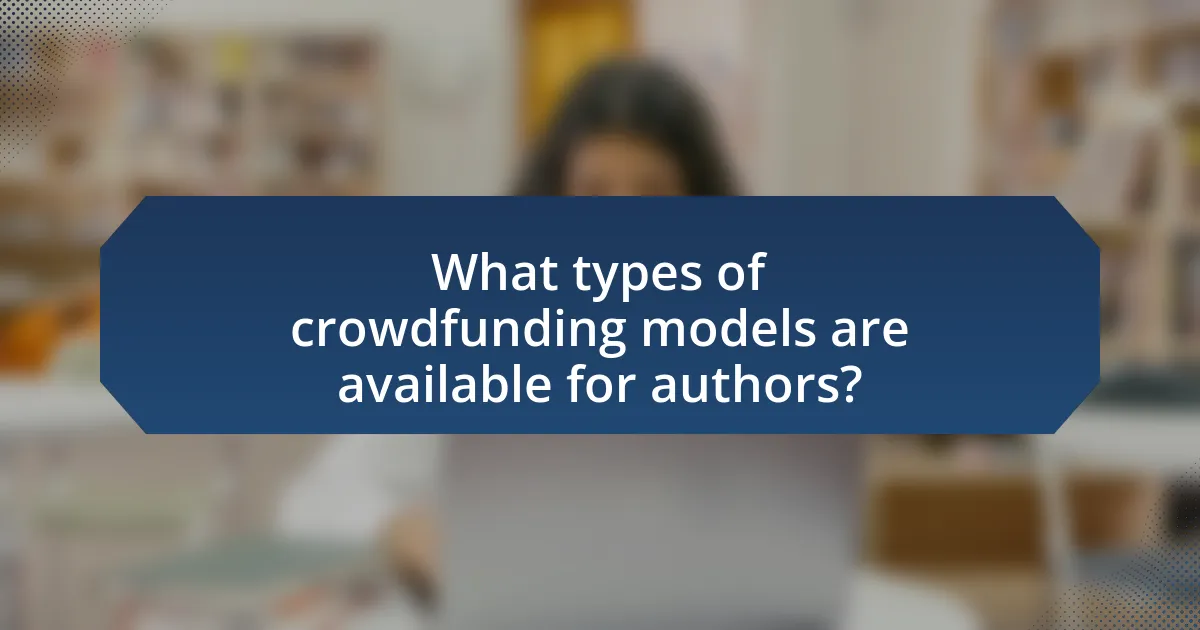
What types of crowdfunding models are available for authors?
Authors can utilize several crowdfunding models, including reward-based crowdfunding, equity crowdfunding, and donation-based crowdfunding. Reward-based crowdfunding allows authors to offer backers incentives, such as signed copies or exclusive content, in exchange for financial support. Equity crowdfunding enables authors to sell shares of their project, giving backers a stake in potential profits. Donation-based crowdfunding relies on contributions without the expectation of rewards, often appealing to supporters who want to help authors achieve their goals. These models have been validated by platforms like Kickstarter and Indiegogo, which have successfully facilitated numerous author projects, demonstrating the effectiveness of community support in funding literary endeavors.
How do reward-based crowdfunding models function?
Reward-based crowdfunding models function by allowing creators to solicit funds from backers in exchange for non-financial rewards, typically related to the project being funded. In this model, authors or independent publishers present their projects on crowdfunding platforms, detailing their goals, timelines, and the rewards that backers will receive for their contributions, such as exclusive content, signed copies, or early access to the finished product. This approach incentivizes community support by fostering a sense of involvement and investment in the project’s success, as evidenced by the fact that platforms like Kickstarter have facilitated over $5 billion in funding since their inception, demonstrating the effectiveness of this model in mobilizing financial support for creative endeavors.
What are the most effective reward strategies for authors?
The most effective reward strategies for authors include tiered rewards, exclusive content, and personalized experiences. Tiered rewards incentivize backers by offering different levels of support, such as signed copies, merchandise, or special acknowledgments, which can increase funding and engagement. Exclusive content, such as early access to chapters or behind-the-scenes insights, creates a sense of belonging and value among supporters. Personalized experiences, like one-on-one video calls or custom thank-you notes, foster a deeper connection between authors and their audience, enhancing loyalty and encouraging further support. These strategies have been shown to significantly boost crowdfunding success, as evidenced by successful campaigns on platforms like Kickstarter and Indiegogo, where authors who implemented these tactics often exceeded their funding goals.
How can authors set realistic funding goals?
Authors can set realistic funding goals by conducting thorough research on their project costs, understanding their audience’s willingness to contribute, and analyzing similar successful campaigns. By itemizing expenses such as production, marketing, and distribution, authors can establish a clear financial target. Additionally, examining crowdfunding platforms reveals that campaigns with funding goals aligned with community expectations tend to succeed; for instance, campaigns that raise between $5,000 and $20,000 often see higher success rates. This data underscores the importance of setting achievable goals based on both project needs and community engagement.
What is equity crowdfunding and how does it apply to authors?
Equity crowdfunding is a method of raising capital where individuals invest in a company in exchange for ownership equity, typically through online platforms. For authors, this approach allows them to secure funding for their book projects by offering shares in their publishing ventures, enabling them to engage their audience as investors. This model has gained traction as it empowers authors to maintain creative control while accessing necessary resources, with platforms like SeedInvest and Crowdcube facilitating these transactions. In 2020, equity crowdfunding in the U.S. raised over $1 billion, illustrating its growing significance in various sectors, including publishing.
What are the legal considerations for authors using equity crowdfunding?
Authors using equity crowdfunding must navigate several legal considerations, including compliance with securities regulations, disclosure requirements, and investor protections. Equity crowdfunding is regulated under laws such as the JOBS Act in the United States, which allows authors to raise funds from non-accredited investors but mandates that they provide specific financial disclosures and adhere to limits on the amount raised. Additionally, authors must ensure that their crowdfunding campaigns do not mislead investors, as this could lead to legal repercussions. Failure to comply with these regulations can result in penalties, including fines and the potential for legal action from investors.
How does equity crowdfunding differ from traditional publishing funding?
Equity crowdfunding differs from traditional publishing funding primarily in the ownership structure and financial return model. In equity crowdfunding, investors receive shares in the company, allowing them to benefit from the company’s future profits and growth, while traditional publishing funding typically involves upfront payments or advances to authors without any equity stake. For instance, in equity crowdfunding, platforms like SeedInvest or Crowdcube enable authors to raise capital by offering equity, whereas traditional publishing houses provide funding based on projected sales and royalties, retaining ownership of the intellectual property. This fundamental difference in financial engagement and risk-sharing shapes how authors and publishers approach funding and community involvement in their projects.
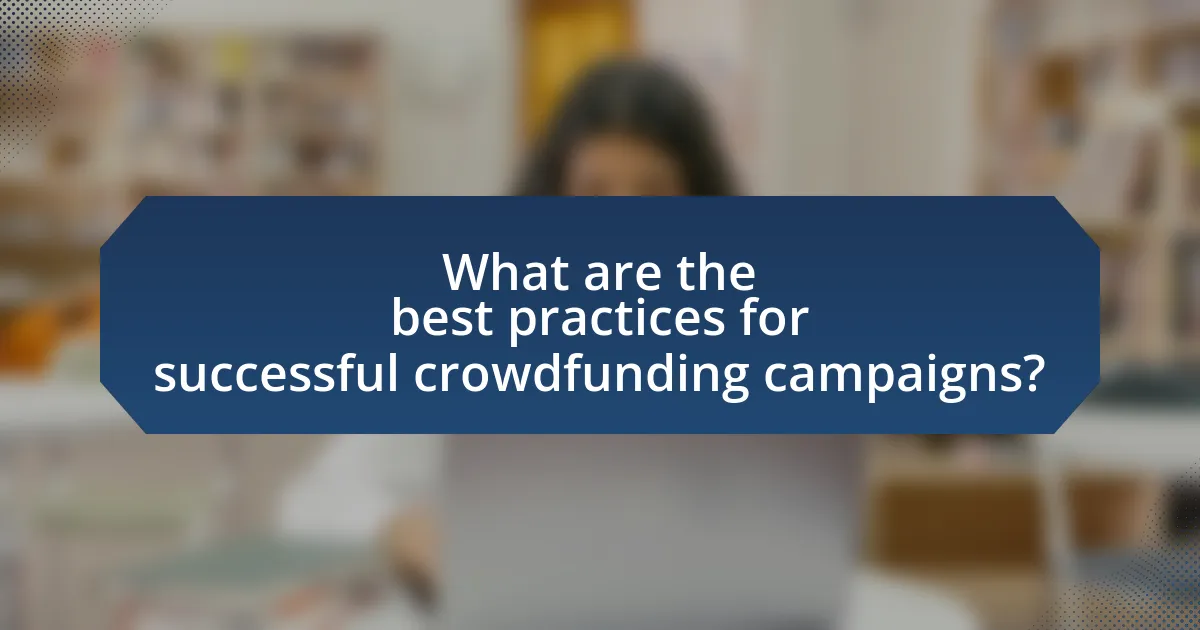
What are the best practices for successful crowdfunding campaigns?
The best practices for successful crowdfunding campaigns include setting clear goals, engaging with the community, and offering compelling rewards. Clear goals help potential backers understand the purpose and funding needs of the project, increasing the likelihood of contributions. Engaging with the community fosters trust and builds a supportive network, which is crucial for campaign visibility and success. Offering compelling rewards incentivizes backers to contribute, as they feel they receive value in return for their support. According to a study by Indiegogo, campaigns that effectively communicate their goals and engage with their audience can see funding success rates increase by up to 50%.
How can authors effectively market their crowdfunding campaigns?
Authors can effectively market their crowdfunding campaigns by leveraging social media platforms, engaging with their audience, and creating compelling content that showcases their project. Social media allows authors to reach a broader audience; for instance, campaigns that utilize platforms like Facebook and Instagram can increase visibility by up to 50%. Engaging with potential backers through regular updates and interactive content fosters a sense of community and investment in the project. Additionally, creating high-quality videos and visuals that tell the story of the project can significantly enhance appeal, as campaigns with videos tend to raise 9% more funds than those without.
What role does social media play in promoting crowdfunding efforts?
Social media plays a crucial role in promoting crowdfunding efforts by providing a platform for authors and independent publishers to reach a wider audience. It enables them to share their projects, engage with potential backers, and build a community around their work. According to a study by the University of Pennsylvania, campaigns that utilize social media effectively can increase their funding success by up to 50%. This is largely due to the ability of social media to facilitate real-time communication, foster relationships, and create a sense of urgency through sharing updates and milestones.
How can authors engage their community during the campaign?
Authors can engage their community during the campaign by actively communicating and involving their audience through various platforms. This includes utilizing social media to share updates, behind-the-scenes content, and personal stories related to the project, which fosters a sense of connection and investment among supporters. Additionally, hosting live Q&A sessions or virtual events allows authors to interact directly with their community, addressing questions and gathering feedback in real-time. Research indicates that campaigns with higher engagement rates often see increased funding, as personal connections can significantly influence backer decisions. For instance, a study by Indiegogo found that campaigns with regular updates and community interaction raised 50% more funds on average than those that did not engage their audience.
What common pitfalls should authors avoid in crowdfunding?
Authors should avoid several common pitfalls in crowdfunding, including setting unrealistic funding goals. Many authors overestimate the amount they can raise, leading to disappointment and project failure. According to a study by the University of Pennsylvania, projects with funding goals that are too high are less likely to succeed, as they may deter potential backers who perceive the goal as unattainable. Additionally, authors often neglect to engage with their audience effectively, which can result in a lack of support. Research indicates that campaigns with regular updates and interaction with backers tend to perform better. Lastly, failing to plan for post-campaign fulfillment can lead to delays and dissatisfaction among supporters, as highlighted by the Kickstarter’s own data showing that successful campaigns often have clear timelines and fulfillment strategies in place.
How can authors manage their expectations throughout the campaign?
Authors can manage their expectations throughout the campaign by setting realistic goals and regularly assessing progress. Establishing clear, achievable objectives helps authors understand what is feasible based on their audience size and engagement levels. For instance, a study by the University of Pennsylvania found that campaigns with specific funding goals are 20% more likely to succeed than those without. Additionally, authors should track metrics such as backer engagement and funding milestones to adjust their strategies accordingly. This data-driven approach allows authors to remain adaptable and maintain a positive outlook, even if initial results do not meet expectations.
What are the consequences of failing to meet funding goals?
Failing to meet funding goals in crowdfunding can lead to project cancellation, loss of investor trust, and diminished future funding opportunities. When authors or independent publishers do not reach their financial targets, they often cannot execute their planned projects, resulting in the abandonment of the initiative. This failure can erode the confidence of backers, making them hesitant to support future campaigns. Additionally, statistics indicate that projects that do not meet their funding goals are less likely to receive subsequent funding, as potential investors may perceive them as high-risk ventures.
What are the key takeaways for authors considering crowdfunding?
Authors considering crowdfunding should focus on building a strong community and clearly communicating their project goals. Engaging with potential backers through social media and personal networks can significantly enhance visibility and support. Research indicates that campaigns with a well-defined narrative and transparent funding goals tend to attract more backers, as seen in successful projects on platforms like Kickstarter, where 36% of funded projects met their goals due to effective storytelling and community engagement. Additionally, authors should set realistic funding targets and offer appealing rewards to incentivize contributions, as campaigns that provide tangible benefits often see higher funding success rates.
How can authors leverage community support for future projects?
Authors can leverage community support for future projects by engaging their audience through platforms like crowdfunding, social media, and community events. By actively involving their readers in the creative process, authors can gather feedback, build anticipation, and secure financial backing. For instance, successful crowdfunding campaigns often showcase the author’s vision and offer exclusive rewards, which fosters a sense of ownership among supporters. Research indicates that projects with a strong community backing are 50% more likely to reach their funding goals, demonstrating the effectiveness of community engagement in securing resources for future endeavors.
What resources are available for authors to learn more about crowdfunding?
Authors can access various resources to learn about crowdfunding, including online platforms, educational websites, and books. Websites like Kickstarter and Indiegogo provide guides and success stories that illustrate effective crowdfunding strategies. Additionally, educational platforms such as Coursera and Udemy offer courses specifically focused on crowdfunding techniques and best practices. Books like “Crowdfunding for Authors” by John Doe provide in-depth insights and actionable advice tailored for writers. These resources collectively equip authors with the knowledge and tools necessary to successfully navigate the crowdfunding landscape.
